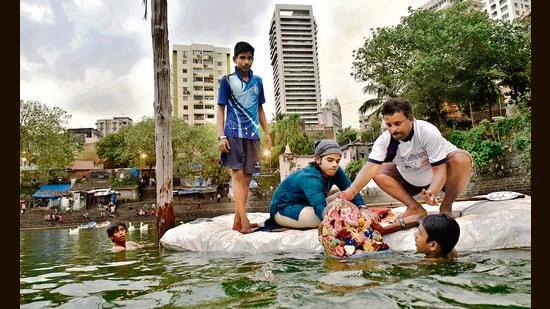MUMBAI: The Bombay High Court on Thursday rejected a plea by a Malabar Hill resident seeking permission to immerse eco-friendly Ganesh idols in the Banganga lake as per the tradition.
The court held that the fundamental rights of the public to clean air and clean water must prevail over individual interests.
On August 26, the Maharashtra Pollution Control Board (MPCB) had issued a circular saying that all the eco-friendly idols less than 6 feet of height shall be immersed in artificial ponds. The bench of acting chief justice Shree Chandrashekhar and justice Aarti Sathe was hearing a plea by Sanjay Shirke, challenging the MPCB’s circular and claiming it was unreasonable and violated their rights.
Shirke had approached the high court seeking permission to immerse eco-friendly idols in the Banganga tank situated in the complex of Hindu Walkeshwar Temple in Malabar Hill. Shirke said that as per the tradition followed by several devotees, immersion should be allowed in natural water bodies.
Shirke referred to the order passed by the division bench of former chief justice Alok Aradhe and justice Sandeep Marne on July 24, which mandated the immersion of Plaster of Paris (PoP) idols up to 6 feet tall only in artificial water for the Ganeshotsav and Navratri festivals. The order followed the state government’s decision that idols up to five feet tall would be immersed only in artificial tanks.
The court said, “We have to make an endeavour that the impact of immersion of idols is bare minimum on the environment. Therefore, idols up to 6 feet should compulsorily be immersed in artificial tanks provided by local bodies.”
Advocate Bhavesh Thakur, representing Shirke, said that the July 24 order based on reports by expert committees, was restricted to Plaster of Paris (PoP) idols and not eco-friendly idols. He claimed that eco-friendly idols should not be included in the category.
Advocate General Dr Birendra Saraf, representing the State, argued that Shirke had no fundamental right to seek such directions from the court, especially for the immersion of idols in Banganga lake, a “protected monument”. He highlighted that the guidelines issued by the MPCB were aimed to avoid contaminating natural water bodies by using artificial ones for the immersion.
Saraf said, “Banganga is a protected monument and the department of archaeology has not granted any permission for immersions there. There are several artificial tanks around the area,” he said, and added that the public could also go to the Girgaon Chowpatty and similar locations for the immersion.
The bench held that, “…some hardship to an individual or a mere infraction of a right of a citizen shall not be a ground to entertain the petition where larger issues are involved.” The court added that the MPCB had the power to issue such guidelines under the pollution laws regime in the larger interest of the public.
The bench added that the MPCB guidelines had not been “misinterpreted” in the July 24 order, since “the right to clean air and clean water has attained the status of fundamental right of every citizen”. The court also observed that MPCB did not have to justify the reasoning behind its guidelines for the immersion of eco-friendly idols as it was merely following the government’s decision.
The court concluded by adding, “The petitioner has not provided data on the number of people involved or the duration for which the immersion tradition has been followed at Banganga. We are not inclined to consider this issue.”
